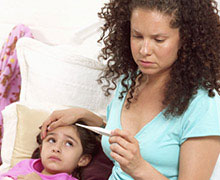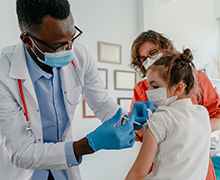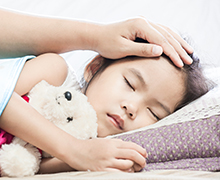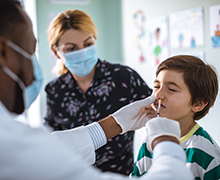Flu Basics, Prevention and Treatment
 Influenza viruses cause flu. The viruses spread from person to person when infected people cough, sneeze or touch objects. Flu can be mild or severe and can even cause death. Older people, children under 5 (especially children under 2), pregnant women and people with certain health conditions are at a higher risk for serious complications from the flu.
Influenza viruses cause flu. The viruses spread from person to person when infected people cough, sneeze or touch objects. Flu can be mild or severe and can even cause death. Older people, children under 5 (especially children under 2), pregnant women and people with certain health conditions are at a higher risk for serious complications from the flu.
Flu season usually begins in December and lasts until April or May in the U.S.
During the 2022–2023 flu season, at least 106 children died from flu and flu-associated illness in the U.S. Most of these children had not received a flu vaccination. Thousands more children were hospitalized.
What is the best way to prevent the flu?
Flu vaccination is the best way to prevent flu infection. All people 6 months and older should get the flu vaccine each year. Healthy children over 2 may get either the shot or the nasal spray vaccine. Your child’s doctor can help you choose the best option for your child.
It’s especially important to get the flu vaccine this season so the healthcare system isn’t overloaded if there are more surges of respiratory syncytial virus (RSV) and COVID-19.
For most people, it's best to get the flu vaccine in September or October, but it’s never too late to get the vaccine at any point in the season.
Where can my family get a flu shot?
- Call your doctor, nurse, or clinic.
- Check the Flu Vaccine Finder.
- Contact your local health department.
- Call the Help Me Grow Washington Hotline at 800-322-2588.
- Visit Flu Vaccination for Seattle Children’s Patients and Families to learn who can get flu vaccine at Seattle Children’s.
 How many doses of vaccine will my child need for the 2023–2024 flu season?
How many doses of vaccine will my child need for the 2023–2024 flu season?
Children 6 months through 8 years of age should receive two doses if this is the first time they’re getting a flu vaccine. The doses are given four weeks apart. If your child needs two doses, get the first dose as soon as it’s available.
Children 9 and older, and children who have received two or more doses in the past only need one dose this flu season.
Ask your child’s healthcare provider if you have any questions.
How else can I prevent the spread of flu?
- Wash your own and your child’s hands often with soap and warm water. Children should sing their ABCs twice in a row while washing their hands to ensure the proper length of time. Use alcohol-based hand cleansers when soap and water are not available. Learn more about handwashing.
- The social distancing and masking efforts to reduce the spread of COVID-19 also help reduce spread of the flu. You may choose to wear a mask when in public and when around people you don’t live with.
- Avoid people who are sick.
- People with the flu should stay home from work or school. They should stay home while they are sick and for at least one day after they no longer have a fever, without the use of fever-reducing medicines. Learn more about flu symptoms and care advice.
- Cover noses and mouths when coughing or sneezing: use tissue or the crook of your elbow when you cough or sneeze and throw the tissue away in a covered trash bin.
- Avoid touching your eyes, nose and mouth with unwashed hands. Remind children to keep their hands away from their face to avoid touching their eyes, nose or mouth.
- Clean surfaces often, including toys, doorknobs, phone receivers, keyboards and tables.
- Avoid sharing personal items such as forks, spoons, toothbrushes and towels.
- The single best way to prevent the flu is to get the vaccine every flu season.
 What are the symptoms of the flu?
What are the symptoms of the flu?
Flu symptoms include fever, cough, sore throat, body aches, headache, chills and fatigue. Some people also have diarrhea and vomiting. Flu symptoms can last as little as one day or longer than a week. It varies from child to child.
For help deciding if your child has the flu, visit:
- Flu Symptoms and Care Advice
- The Sick Day Guessing Game: Cold or Flu?
- Similarities and Differences Between Flu and COVID-19 from the CDC (Spanish)
When should I take my child to the doctor or go to the hospital?
Most people with the flu do not require medical care.
Visit flu symptoms and care advice to learn more about when to call 911, when to call your doctor and when to treat the flu at home.
If your child has flu symptoms, especially if they are under 5 years, you can call their doctor to help decide whether or not they need to be seen in the clinic or hospital.
What if my child has a chronic health condition and the flu?
Children with chronic health conditions, like heart or lung disease, diabetes, asthma, a neurodevelopmental condition or a neuromuscular disorder can get very sick from the flu. If your child has a chronic health condition and has flu symptoms, call your child's doctor. Your child may need to be tested and treated for the flu. Your child should also get the seasonal flu vaccine. Learn more about flu and children with chronic health conditions.
How do I treat my child's flu at home?
- Make sure that your child drinks plenty of fluids.
- Have your child rest and do quiet activities. Check Activities for Children Sick at Home for ideas.
- If your child is uncomfortable because of a fever, you can give acetaminophen (Tylenol) if your child is over 3 months old. Or, you can give ibuprofen (Motrin) if your child is over 6 months old. Make sure to give the correct dose, based on your child's weight, using the measuring tool that came with the medicine.
- Never give your child aspirin.
- Do not give multiple-symptom cough and cold medicine to children under 6 years.
- Encourage everyone at home to clean their hands often.
- Keep your child home while they are sick and for at least one day after they no longer have a fever without the use of fever-reducing medicines. Check with your doctor if your child has the flu and close contacts at home are pregnant, are young infants, are elderly, have a suppressed immune system or have a chronic medical condition.

More about the flu:
- Prevent Seasonal Flu from the CDC (Spanish)
- Information for the 2023-2024 Flu Season from the CDC (Spanish)
- Seasonal Flu Vaccines from the CDC (Spanish)
- Misconceptions about Seasonal Flu and Flu Vaccines from the CDC (Spanish)
- Who Needs a Flu Vaccine from the CDC (Spanish)
- Which Flu Vaccine Should Children Get from the American Academy of Pediatrics (Spanish)
- Key Facts about Seasonal Flu Vaccine from the CDC (Spanish)
- Dr. Livewell: You Versus the Flu (Comic for Kids) (PDF)
- Families Fighting Flu: The Story of Joseph Marotta (Video)
- Flu News and Spotlights from CDC (Spanish)
- Questions and Answers about Flu from the Washington State Department of Health (Chinese, Russian, Spanish, Vietnamese)
- Influenza from Public Health – Seattle & King County (Chinese, Korean, Russian, Somali, Spanish, Vietnamese)
Information updated: September 20, 2023